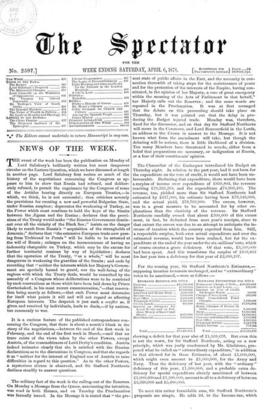NEWS OF THE WEEK.
THE event of the week has been the publication on Monday of Lord Salisbury's brilliantly written but most dangerous circular on the Eastern Question, which we have discussed at length in another page. Lord Salisbury first recites so much of the history of the negotiations concerning the Congress as ap- pears to him to show that Russia bad refused, and deliber- ately refused, to permit the cognisance by the Congress of some of the Articles bearing directly on European Treaties,—in which, we think, he is not successful ; then criticises severely the provisions for creating a new and powerful Bulgarian State, under Russian auspices ; deprecates the weakening of Turkey, as the Power which must continue to hold the keys of the Straits between the JEgean and the Euxine ; declares that the provi- sions of the Treaty would make "the Russian Government domin- ant over all the vicinity of the Black Sea ;" insists on the danger likely to result from Russia's " acquisition of the strongholds of Armenia;" declares that "the extensive European trade now pass- ing from Trebizond to Persia " will be liable to be arrested at the will of Russia ; enlarges on the inconvenience of having an indemnity chargeable on Turkey, which may be the excuse for farther territorial cessions by way of liquidation ; declares that the operation of the Treaty, " as a whole," will be most dangerous in weakening the guardian of the Straits ; and ends by recording that " neither the interests which her Majesty's Govern- ment are specially bound to guard, nor the well-being of the regions with which the Treaty deals, would be consulted by the assembly of a Congress whose deliberations were to be restricted by such reservations as those which have been laid down by Prince -Gortschakoff, in his most recent communication,"—that reserva- tion being merely as follows,—that each Power must determine _for itself what points it will and will not regard' as affecting European interests. The despatch is just such a souliet as, if ,given and received by individuals, leads to duels,—if by nations, too commonly to war.


































